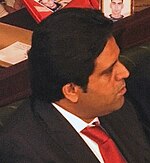Free Patriotic Union
| الاتحاد الوطني الحرّ Free Patriotic Union |
|
|---|---|

|
|

|
|
| Party leader | Slim Riahi |
| Deputy Chairman | Nejib Derouiche |
| founding | May 19, 2011 |
| Alignment | Economically liberal , secular , populist , center-right |
| Colours) | red |
| Parliament seats |
16/217 |
| Website | www.upl.tn |
The Free Patriotic Union ( Arabic الاتحاد الوطني الحرّ, DMG al-ittiḥād al-waṭanī al-ḥurr , French Union patriotique libre ), also known by its French acronym UPL , is a populist and center-right political party in Tunisia . It has been run by the large entrepreneur Slim Riahi since it was founded. The party's ideology is based on economic liberalism and secularism . She positions herself in the middle of the political spectrum.
history
It was officially founded on May 19, 2011, after the Jasmine Revolution of January 2011, and was initially called the "Liberal Patriotic Union". A month later she changed the name part libéral ("liberal") to libre ("free"). The party spokesman is Mohsen Hassan and the party's vice president is Nejib Derouiche.
The party's leader and promoter, Slim Riahi, grew up in Libya where he amassed a fortune investing in the petroleum, energy, and real estate development sectors. According to his opponents, he had close ties with Saif al-Islam al-Gaddafi , the son of the Libyan leader. In January 2011 he returned to Tunisia as part of the "Jasmine Revolution". Riahi is also president of the Tunisian football club Club Africain . The party advocates a free market economy and a modern society and rejects Islamism .
The Free Patriotic Union was best known in 2011 for its expensive and elaborate election campaign. She offered potential voters bus trips to party meetings. Unlike other parties, the Free Patriotic Union was able to pay its candidates and activists. However, the party was accused of “buying” candidates and supporters. The party was also criticized for the appearance that the party mixed economic interests with political activity. The Free Patriotic Union came into conflict with Tunisia's electoral authority, ISIE, as it continued its advertising campaign from September 12th to 30th, ignoring the ISIE's ban on campaigning during that period. Although she presented herself as the only serious opponent of the Islamist Ennahda before the election , she ultimately only won one seat on the Constituent Assembly .
In the first regular parliamentary election under the new constitution in October 2014, the UPL became the third largest force with 16 of the 217 seats. In the subsequent presidential election , their party leader Riahi retired with 5.55% in fifth place.
Web links
Individual evidence
- ↑ a b Joachim Paul: The Tunisian parliamentary elections - An overview of the most important parties. Heinrich Böll Foundation, Tunis office, October 21, 2014
- ↑ a b Annette Steinich: Parliamentary elections - seculars win in Tunisia In: Neue Zürcher Zeitung (online), October 30, 2014.
- ↑ Angelique Chrisafis: Tunisia's political parties. (PDF; 129 kB) The Guardian, October 19, 2011, accessed October 24, 2011 .
- ↑ Arrêté du ministre de l'Intérieur du 19 may 2011, Journal officiel de la République tunisienne , n ° 37, 24 May 2011, p. 746
- ↑ Arrêté du ministre de l'Intérieur du 16 juin 2011, Journal officiel de la République tunisienne , n ° 45, 21 juin 2011, p. 955
- ↑ Eymen Gamha: Free Patriotic Union. (No longer available online.) Tunisia Live, October 3, 2011, archived from the original on March 9, 2012 ; Retrieved October 23, 2011 . Info: The archive link was inserted automatically and has not yet been checked. Please check the original and archive link according to the instructions and then remove this notice.
- ↑ Winner of the election in Tunisia without a parliamentary majority. ( Memento from October 31, 2014 in the Internet Archive ) In: Kleine Zeitung (Online), October 30, 2014.
- ↑ Sam Bollier: Who are Tunisia's political parties? Al Jazeera , October 9, 2011, accessed October 22, 2011 .
- ^ A b Yasmine Ryan: Tunisian newcomer spends big on campaign. Al Jazeera , October 21, 2011, accessed October 23, 2011 .
- ^ Eileen Byrne: Tunisia party runs into controversy. In: Financial Times. September 27, 2011, accessed October 23, 2011 .
- ↑ Klaus D. Loetzer: Updated information about parties, election results, coalitions to form a government. Part II, entry from October 6, 2011, Konrad-Adenauer-Stiftung Country Office Tunisia / Algeria / Libya.
- ↑ Amel Belhadj Ali: UPL-Ennahdha - D'argent et de religion. WMC, October 5, 2011.